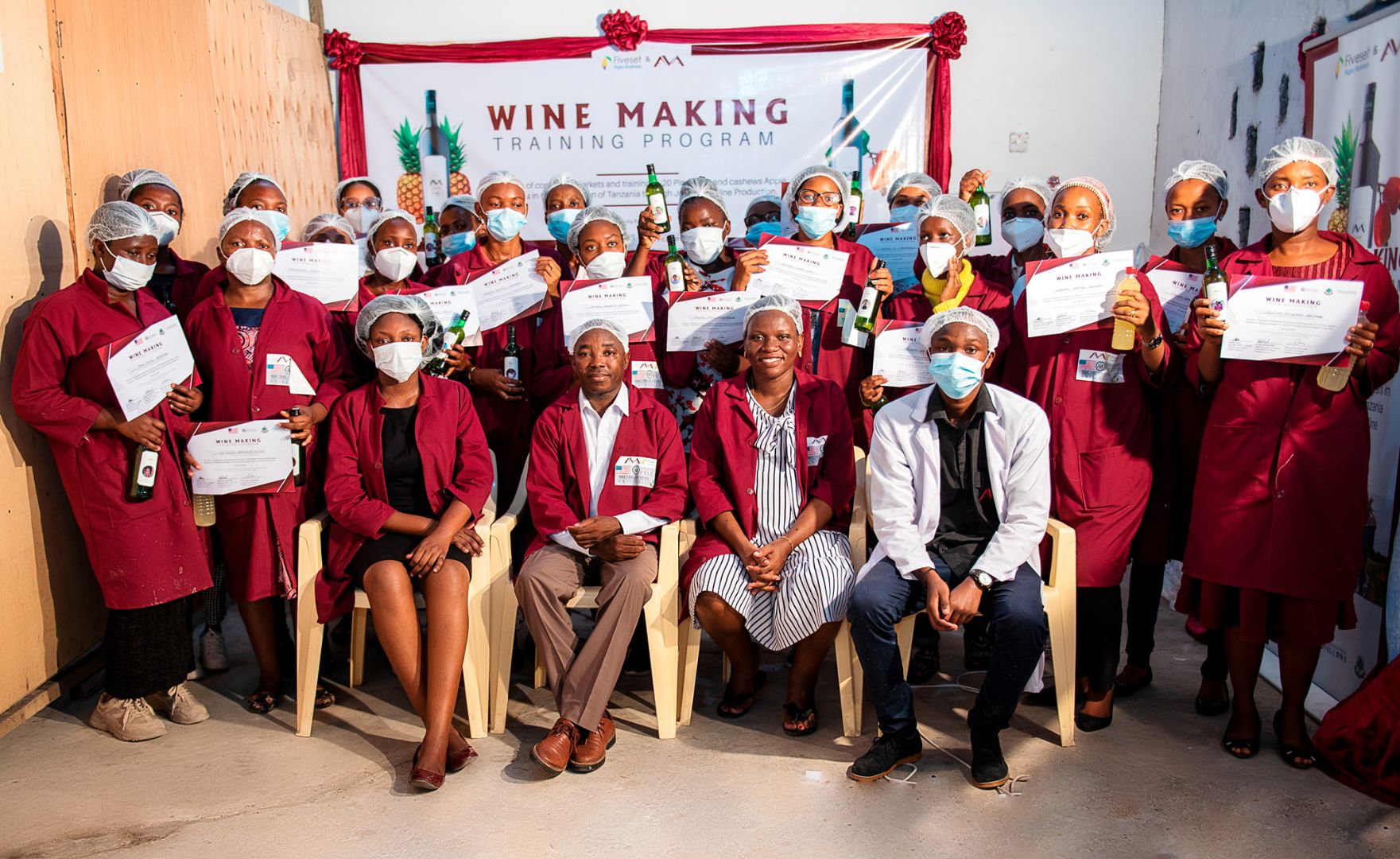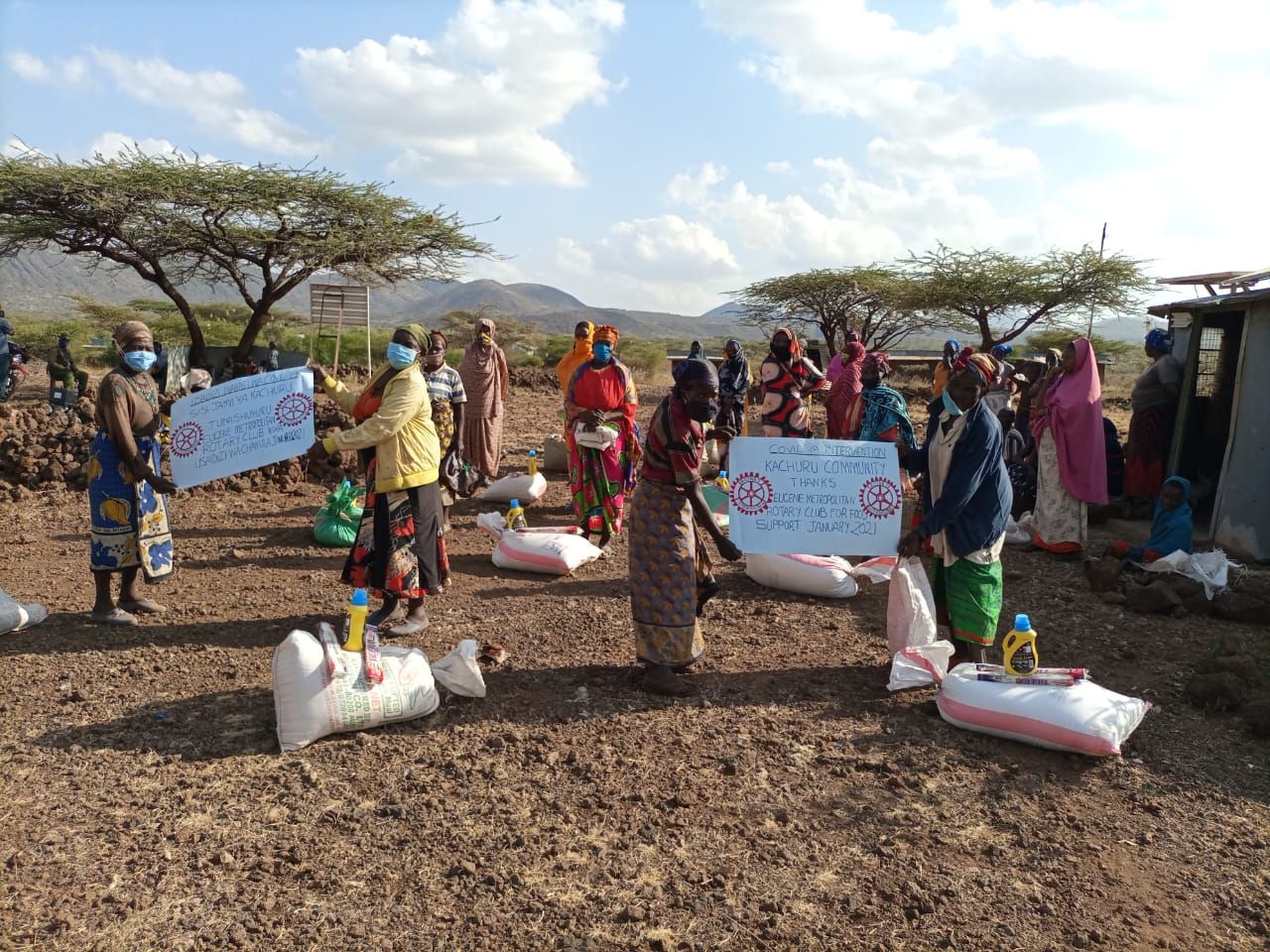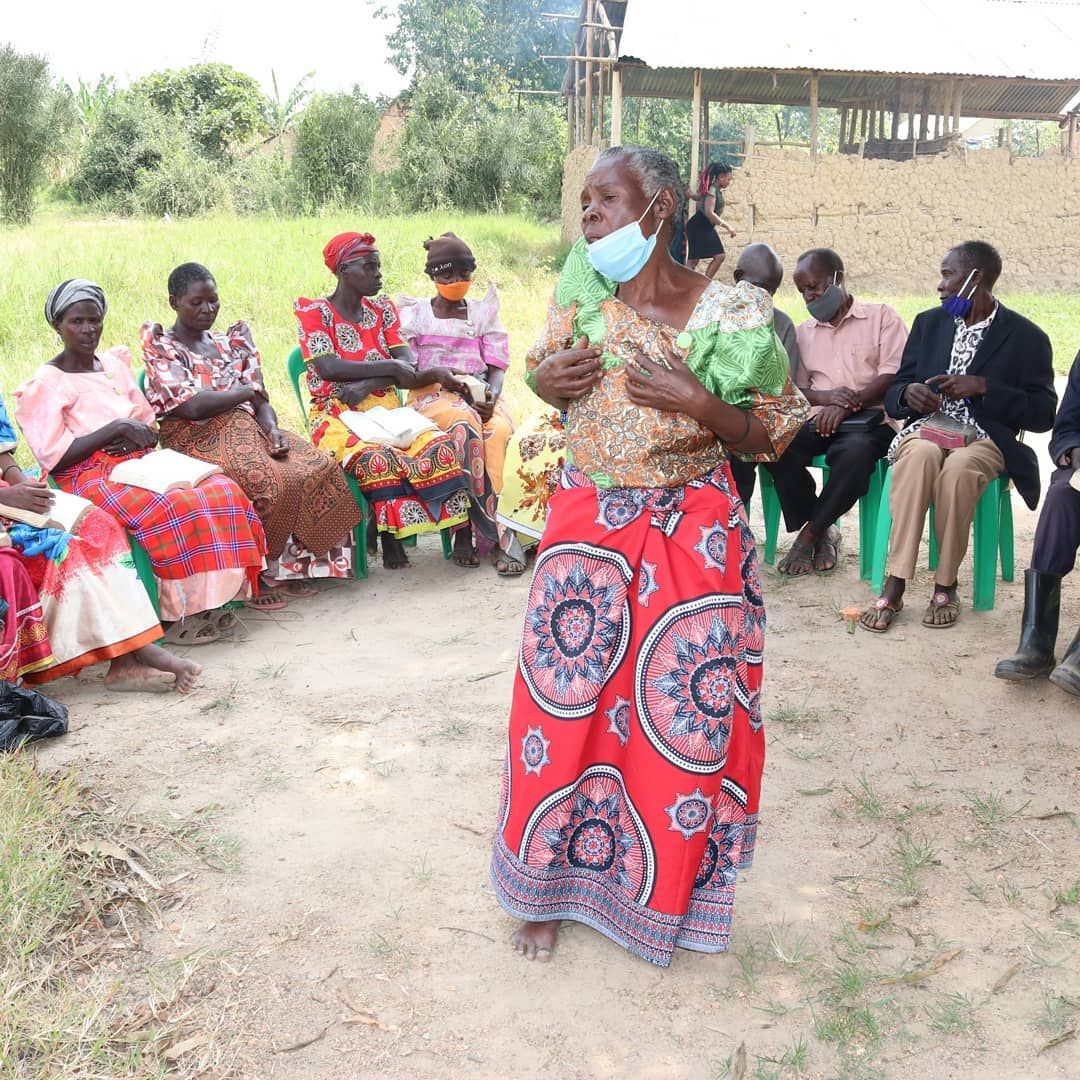Last summer, we spoke with a few alumni of the Professional Fellows Program—Advancing Women Agribusiness Entrepreneurs and Innovators, a four-week program hosted at Michigan State University and led by the Alliance for African Partnership that connects Ugandan, Tanzanian and Kenyan agribusiness professionals and entrepreneurs with their counterparts in Michigan for knowledge exchange and capacity building. The program encourages mutual interaction and learning among the professional fellows, U.S. mentors, technical experts and in-country partners which lead to long-term, innovative and mutually beneficial projects between the U.S. and Africa.
Much has transpired since then, and we’re revisiting their work and lessons learned over the last year.
Read on to find out how three entrepreneurs have responded to the pandemic and embraced ingenuity in promoting community health in East Africa.
My organization (Ava Group Investments) produces pineapple wine under the name Ava Santiago to provide constant markets to the growers and employment opportunities to young adults (18-35).
We were able to hold an online meeting to engage young people and educate them on the effect and impact of COVID-19. We invited my cousin, a medical doctor, MD and a colleague, a registered nurse who happens to be a part time health consultant to AGI to enlighten us on the public health and financial implications of the pandemic. The take away from the meeting with the team and young people in my community was to create DIY personal protective equipment when handling day-to-day chores and avoid contamination as well as to create DIY sanitizers with 89% ethanol and aloe vera gel.
I can attest that the effect of the pandemic affected the economic livelihoods of my suppliers, sessional workers and part-time employees by delaying the production season. 
I cater to mostly entertainment, celebrations and corporate events. At the beginning of the pandemic, I started experiencing hardship in my acquiring of raw materials due to port and airline lockdowns. There was also a drastic decline of sales which made me rethink production. I was worried about my customers’ safety and well-being, hence decided to engage young people in an open discussion. Through reaching out to youth groups I realized most young people had myths and misconceptions about the spread of Coronavirus and were oblivious to the financial implications. This prompted me to initiate sit-downs with medical and financial experts with a number of young influencers in my community and we shared a couple of key thoughts on eliminating spread and contamination while learning ways to live safer, healthier and better.
Discover value in what you are doing with what you have. For instance, farmers look for markets from other organizations and local consumers -- instead they should add value to their harvests by making pineapple juice, biscuits, cakes, wine and dried pineapples instead of having a sole source of market. By doing so they would widen the market opportunities and generate more income. So there is the need of training growers on pineapple commercial value addition. The organization is planning to have a pineapple value addition training in the near future. This is a lesson I am carrying not only for my dear pineapple growers, but for my organization as well.
PFP has cemented my ability to change the community, being there for the community and to always remind myself that whatever I do must be for the benefit of the community. The pandemic was very scary and brought fear to the community. My PFP experience made me feel like I am responsible for the people who work to make my organization scale up.
We were able to cultivate a sense of togetherness and loyalty among the seasonal workers, part-time workers and permanent employees. The teamwork in coordinating the online and informative talks were key in alerting consumers and the team in general that we care about each other and we want each other to be safe by avoiding infection spread while ensuring that there are other ways to earn economic livelihood.
Through the pandemic, I recognized there is the need of training growers to realize their ability to add commercial value to the pineapple as a way of preservation. Pineapple can be used to make donuts, wine, juice, dry them and make tea bags to mention a few instead of depending on cash crop consumers such as I, to make pineapple wine. I hope they would be able to find market through themselves and generate more income to cater for their families.
I am still making pineapple wine under the name Ava Santiago to provide market and employment opportunities to young adults (18-35). Ava Santiago wine market was limited due to lack of certification from Tanzania Bureau of Standards, an authority that was mandated to undertake measures for quality control of products of all descriptions and to promote standardization in industry and commerce. We managed to get Ava Santiago wine certified by TBS, as the results we will extend markets to hotels, restaurants and wine shops to mention but a few.
From November to April every year is a pineapple season, due to the pandemic farmers whom I work with got loss because we shut down production. Pineapple growers in the coastal region of Tanzania depend on local community consumers (who are now securing food stuff) as their immediate market. The knowledge of the farmers on what to do with pineapples is limited.
In January 2021, I and Enikia Bisanda (PFP alumna) conducted a training that was fully sponsored by the U.S. Department of State and organized by Michigan State University. The project was about Provision of Consistent Markets and Training to 20 Pineapple and Cashew Apple Growers in the Coastal Region through Juice and Wine Production. Participants were trained on adding commercial value to pineapple and cashew apples through wine and juice. Participants were connected to animal feed makers to supply processed pineapple wastes for animal feeds in the future hence an environmentally friendly project. Ava Group Investment, a company that produces Ava Santiago wine supply processed pineapple wastes to animal feed makers for making animal feeds to sell to dairy farmers at a very affordable price. The project was successful because trainees have established juice shops and others have started making watermelon wine.
Farmers’ awareness on COVID-19 is wide, they are doing business considering preventive measures such as maintaining social distancing and wearing masks. Pineapple growers are seeking knowledge on commercial value addition to their harvests due to the effect of pandemic on their harvested pineapples last year. It was manifested during a call for application to train 20 women organized by Michigan State University and sponsored by the U.S. Department of State, we received more than 1,500 applications. Pineapple growers’ need to process pineapple is to explore more markets, generate more income and employment opportunities.
Through the training farmers are making pineapple juice, wine, biscuits etc. instead of selling raw pineapple. Commercial value addition to pineapple generates income to farmers.
During this time I have learned to be patient and persistent. Pandemic has a very unscrupulous impact on business and life in general since giving up is not an option then it is about being patient, persistent and creative in whatever you do to cope with the current situation.
During the pandemic NECOFA has been supporting the Kokwa Island community in Baringo County and Kachiuru community in Isiolo County. We have been working with these two communities who are pastoralists in arid and semi-arid areas and we know their challenges. We have been distributing food stuff, bar soaps and face masks to these two communities. In addition to our humble contribution, our partner Friends of Kenya Schools and Wildlife from the U.S.A and friends from Scotland have given us a helping hand in addressing the challenges during these difficult moments for many Kenyans.

Kokwa Island community efforts to protect themselves from the virus inspired me. Individual households' innovative way of improvising hand washing techniques to ensure they have running water was a big inspiration. NECOFA has been working with these two communities and we understand their needs quite well. Through our community animators in the two regions, we identified the most vulnerable households facing more challenges during this pandemic.
Given a chance I would create community awareness on preparedness and disaster management.
My experience gained at Allen Neighborhood Center in East Lansing Michigan of helping the less privileged and elderly people in the society drew my efforts in supporting the vulnerable people during this pandemic. The major challenge is food for the vulnerable families and the experience of food pantry at ANC led me in thinking of distributing food and other essentials to the needy.
In the long term, I hope these communities will have sustainable sources of food and income generation activities.
We are still supporting the two communities and we have been distributing food and soaps since June 2020. Not much has changed but we have distributed washable face masks to all primary pupils.
Nutrition and health improvement of the vulnerable families and especially children. Slight improvement of living standards of some vulnerable families. Vulnerable families have gained a lot of confidence and dignity. They appreciate the love extended to them during the difficult moments
I have learnt that we should not take things for granted and that any little support given to a needy person means so much to him or her. I’ve also learnt there is need to identify strategy of establishing more sustainable projects/support to our vulnerable communities "avoid giving them fish but instead train them how to fish” and that there are many vulnerable people in the society that require support in one way or the other.
Our elderly beneficiaries already face extreme challenges as they continue to survive and thrive. The threat of COVID-19 adds additional struggles to an already full plate.
Bagonvu Elderly Women’s Foundation launched an initiative called BEWF COVID-19 Relief Assistance in Rakai District of Rural Uganda to provide welfare support to the elderly and vulnerable children and also to serve as a lifesaver to local businesses. In March 2020, with a team of medical personnel, bearing in mind the measures of social distancing, we carried out door-to-door sensitization about the preventive measures, signs and symptoms of COVID-19 to 100 elderly families. Furthermore, with the support of local volunteers, we helped 100 elderly families set up foot pedal hand washing stations using the available local means and provided a bar of soap to each family.
In April and May 2020, we provided a bar of soap and direct cash aid of $25 to 95 families. The money allowed them to purchase a month’s worth of food. We decided to give them money so that they can choose what they prefer to eat, and also to support local markets in their community and help alleviate economic fallouts for local businesses.
Aside from the actual virus, the economic consequences of COVID-19 are hurting many people, especially the elderly in rural Uganda. Transportation interruptions limit access to markets and supply chain disruptions have caused hikes in local prices. It is especially important to care for the most vulnerable. The elderly already struggle with food insecurity and thus are less prepared for an epidemic. Left without aid, they are more likely to experience higher mortality rates, higher malnutrition, and are more vulnerable to the disease.
Lastly, Rakai District is on the border with Tanzania with many porous roads and with the highest number of positive cases, and thus the need to be more vigilant and keeping our people informed about the pandemic.
I have learned that my neighbor’s safety is my safety, it’s a joint effort. We’re in this together
The PFP experience enabled me establish networks and friends that have supported this initiative since March
The project will reduce the impact of a food crisis that is capable of causing malnutrition, high mortality rates among the elderly and vulnerable children, and diseases related to poor feeding practices. This could also be a financial lifesaver for local food stores that are already facing economic hardships during this time.
We hope to restore dignity amongst the elderly as this gives them the power to make economic choices.
https://www.facebook.com/Bagonvu/
Since last March, we have reached out to 411 elderly headed families with approximately 5 beneficiaries each with cash support so as the money is used to support local businesses.
We organized a medical camp whereby the physician visited the seniors in their communities, 213 seniors were examined and diagnosed accordingly, this was done to save the seniors from the long distances to the government health facilities and long hectic queues.
We have also conducted 10 adolescent trainings to both the girls and boys respectively in 10 parishes by the end of these trainings we had reached out to 1,898 adolescents, with the aim of equipping them with sexuality knowledge and safeguards so as to curb down the numbers of teenage pregnancies and drug abuse.
We organized a Christmas gifting fundraising where we gave out gift hampers to 100 needy and isolated seniors, these hampers had foodstuffs such as rice, bread, salt, tea leaves, sugar, a packet of matchbox, maize flour. We did this after noticing the number of seniors that missed out from the love of the season, this was to make them feel loved and appreciated.
In February 2021, we launched the O.A.S.I.S Program. OLDER ADULTS STRONG IN SERVICE O.A.S.I.S. is a ministry designed to encourage, build, and grow senior adult men and women 50 and older in their Christian and social relationships. This ministry reaches men and women through bi-monthly fellowship meetings, teaching, group discussion, prayer, and an array of events and activities such as physical exercise, a hot meal all while seeking to grow in Christ and promoting socialization. Through this program seniors get to meet their longtime friends, share issues with each other, make new friends, enjoy a hot cup of tea or porridge with sugar as most of them can’t afford sugar.

We noted a fall in sickness among the seniors after the medical camp and the seniors are now happy and their hearts are at ease after having a one on one with the doctor.
We have only lost two seniors from the community, we expected the numbers to be high but due to the sanitization, food supplies and the cash reach outs the mortality rates and malnutrition levels went down.
Many local businesses have survived the COVID storm in my community as the direct cash aid given to the seniors, this served as a life saver to local businesses as there was continued cash circulation through the purchases made by the seniors.
We have seen community members getting back to each other, providing support to those in need, the youths getting involved in voluntary work, what an amazing spirit!
I have learnt that for any organization to thrive and survive, it must come up with a sustainability plan to continue running and operating during such disastrous times. We have lost many sponsors during this pandemic and we found ourselves unable to carry on our projects. I have also learnt that we need to empower the people in our communities and carry out community owned projects, so that the community gets to appreciate your efforts because they are yielding fruits to them. In short, if we wait for the governments, it'll be too little, too late; if we act as individuals, it'll be too little; but if we act as communities, it might just be enough, just in time.
---
The Professional Fellows Program is a U.S. Department of State funded program that strengthens visiting fellows’ skills in agro-entrepreneurship and agri-food system innovation, and addresses issues of women’s economic empowerment.
The program welcomes young Tanzanian, Kenyan and Ugandan professionals from diverse backgrounds in private, public, non-governmental and education sectors who are either women agribusiness entrepreneurs or individuals working to increase women’s economic engagement in the agricultural sector.